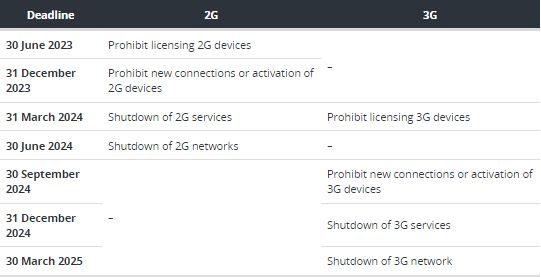South Africa’s Information Ministry Announces Proposed 2G and 3G Shutdown Plan

Khumbudzo Ntshavheni, South Africa’s minister of communications, has put up a schedule for decommissioning the 2G and 3G networks by 2025. The plan is contained in the ministry’s next-generation radio frequency spectrum draft policy.
On Wednesday, Cabinet approved the policy, allowing it to be released for public comment. According to a statement released by Cabinet on Thursday, it noted that radio frequency spectrum was a scarce natural resource that is important to the expansion of South Africa’s digital economy and communication infrastructure.
“Radio frequency spectrum is a finite natural resource that is vital to the growth of South Africa’s digital economy and communication infrastructure,” Cabinet said in a statement on Thursday.
“The proposed policy intends to support the spectrum allocation and licensing for fixed mobile; broadcasting; aeronautical and marine; research and development; community access, and other relevant industries,” President Cyril Ramaphosa’s cabinet ministers said.
“The policy also seeks to promote equity and fair allocation to contribute towards the transformation of the sector and accessibility of digital connectivity even in outlying parts of the country.”
Recall that the African National Congress (ANC) had in August advised that the country establish a formal schedule for the phase-out of 2G and 3G connections to modernize the mobile networks. Ntshavheni had asserted that switching off 2G and 3G will boost broadband quality and lower data prices for all South Africans. The bill has now been approved and the ministry is moving to swiftly implement its plans.
The draft policy outlines the anticipated deadlines for South Africa’s sunsetting of 2G and 3G.

It’s not simple to turn off the 2G and 3G networks in South Africa. According to Cell C, phasing out earlier network technologies is significantly hampered by the cost of 4G and 5G capable devices.
Peter Ndegwa, CEO of Safaricom, cited high cost of 5G-compatible phones as a deterrent to the roll out 5G networks by African telecoms. He also added that it would be economically inefficient to roll out a commercial 5G network when there aren’t enough mobile devices that can use it.
Prior to now, MTN informed MyBroadband that some of its clients primarily relied on its 2G network for Internet of Things (IoT) applications. As a result, MTN would find it simpler to turn down its 3G network than 2G. MTN stated that it would probably turn off 3G before turning off its 2G network as a result.
